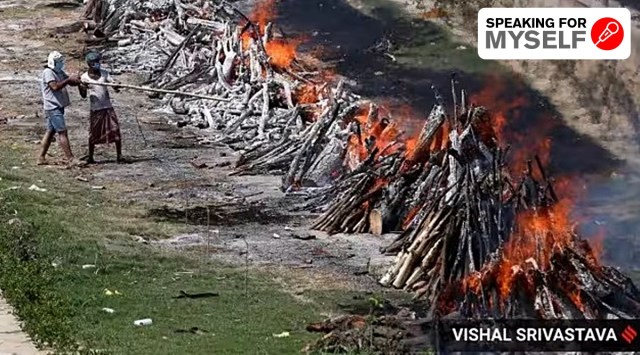
We work too hard.
We’re too tired
To fall in love.
Therefore we must
Overthrow the government.
We work too hard.
To overthrow the government.
Therefore we must
Fall in love.
— Rod Smith
Funerals are funny in their irony. Devastation meets warmth, sobs meet jest. Fortitude is clearest when someone is grieving death.
Less than three years ago, we were all stuck — in a moment that was littered with points of no return. The Covid-19 pandemic claimed more lives than we bothered to count. A Reuters report talks about how at least nine family members grieve the loss of one person, on average. Then there are friends and lovers and colleagues and strangers. For countless people in the world, myself included, grief seems to be the defining sentiment of this decade. The pandemic went away, it just took thousands with it. The uncertainty and vulnerability of that time seemed unending.
And yet, it seems to not have mattered, at all. Nobody is accountable for all those we lost and all that we lost. I recall, in the thick of the second wave, I was volunteering with various organisations that were working to offer relief to people who were sick, bereaved, starved, forgotten. It was a race for oxygen, beds, money. We were struggling to breathe.
When I think of the pandemic, a few things come to mind. Few people, more accurately. At the time, a friend, a junior, Peter (name changed) started an organisation to help queer and trans people escape their abusive homes. He ended up saving hundreds of lives. He was trans; he ran away from his family at the beginning of the pandemic. Because of him, there are many in the LGBTQ+ community today who have a house, a degree, a life.
In April of 2022, he died by suicide. He was to turn 21 that month. In an interview he gave to me not two days before that, he spoke of all the ways the love he found from friends and chosen family saved him. His biological family invited none of us to his funeral. A few other trans friends followed Peter shortly after.
The pandemic is over. The grief is not. India is currently struck by significant social, economic and political strife. Most days it seems rather apparent that there is an ongoing project of hate. Newsrooms can be depressing places to be in during times like this. Sitting at my daily job — one that necessitates I know everything that is wrong with the world — I watched many families and labourers flee Nuh after communal violence broke out. Several homes continue to remain deserted, many were razed by the government. I watched BBC offices get raided — “surveyed”, sorry — from my office desk, wondering how afraid I am allowed to be. As we ramp up to the 2024 election season, having sat through the 2019 general election, fear and anticipatory grief grip me (think, the Citizenship Amendment Act, abrogation of Article 370). The price so many of us, mostly minorities in this nation have to pay every day, a price that quadruples during election time, is haunting. And we are far from seeing the last of it.
Hate speeches with impunity are on the rise. There are many in jails for whom the process is designed to be the punishment.
Violence has always been a way of life in this country. It predated this government and is sure to outlast it too. Still, few need statistics to feel the escalation in fear. Personal liberties seem to be slipping through our fingers; lynchings, online privacy breaches, and calls for violence seem rampant.
Hope feels dangerous to me. Not because love is lacking. But because our collective grief for the loss of love seems to count for very little. Flipping through newspapers, scrolling through news feeds, often, I wonder, “Is this hate unique to us?” “How productive is hope in a culture of hate?”
So, what does love count for then? Is hope foolish in a world where the powers that be seem to be deaf, blind, apathetic?
I recently found out through mutual friends that Peter’s organisation is up and running again. His friends and chosen family took charge and help is available again. We also ended up holding a memorial service for him. It was lit up with rage, devastation, love, hope. There are so many groups now that work to gather and provide resources for people hit by violence, injustice, and devastation.
The future is uncertain, meek even, perhaps. At least, to me, on lots of days, it seems that way. Evenings with friends and lovers have been spent discussing despair — invoking hope. In chai chats at work, in night stays with friends, in rooms with grief, loss, and community — hope has often given me company. It has also bettered the lives of many. To dare to continue loving is perhaps the key to this project of hate. I hope there are no more funerals. More than that, I hope at every funeral, love, hope and community are in attendance.
sukhmani.malik@expressindia.com